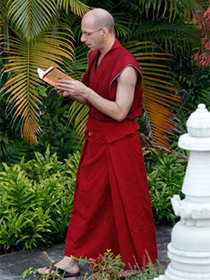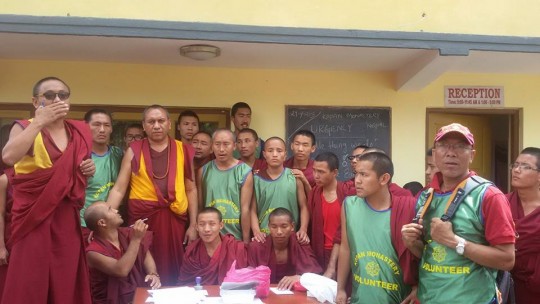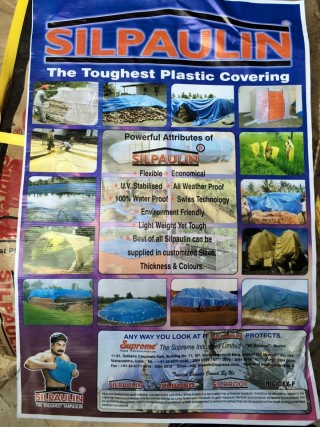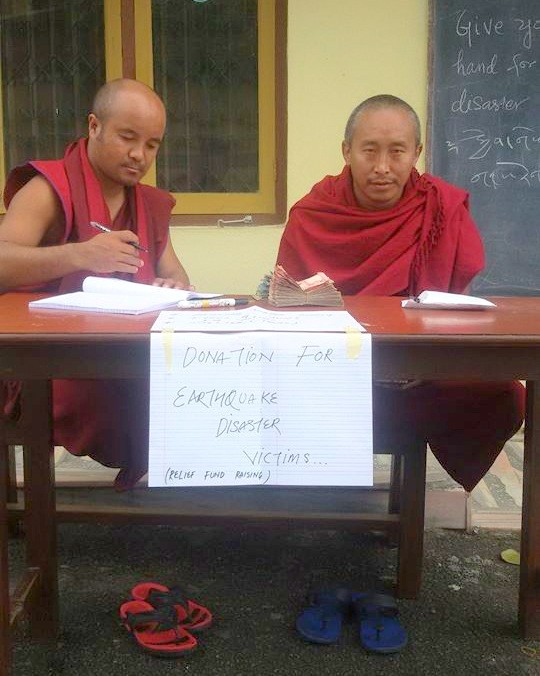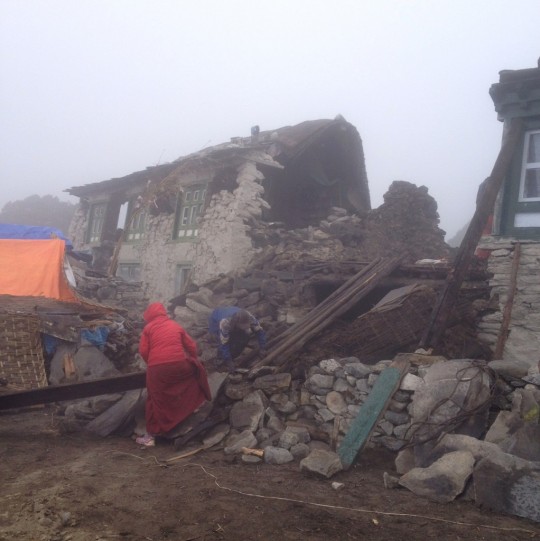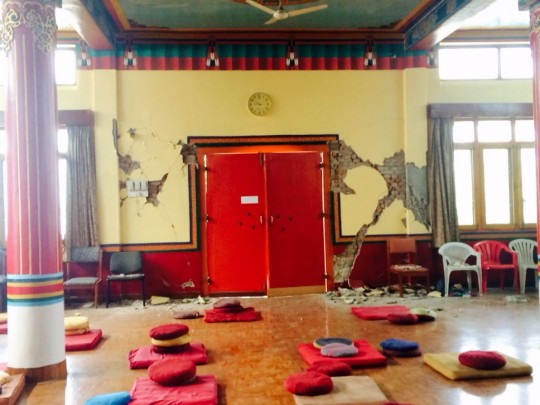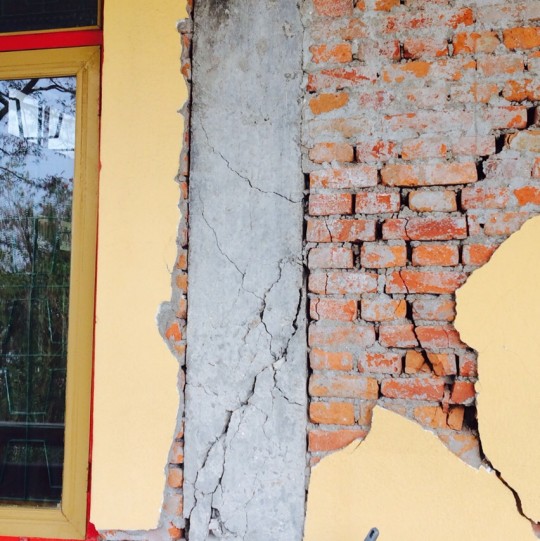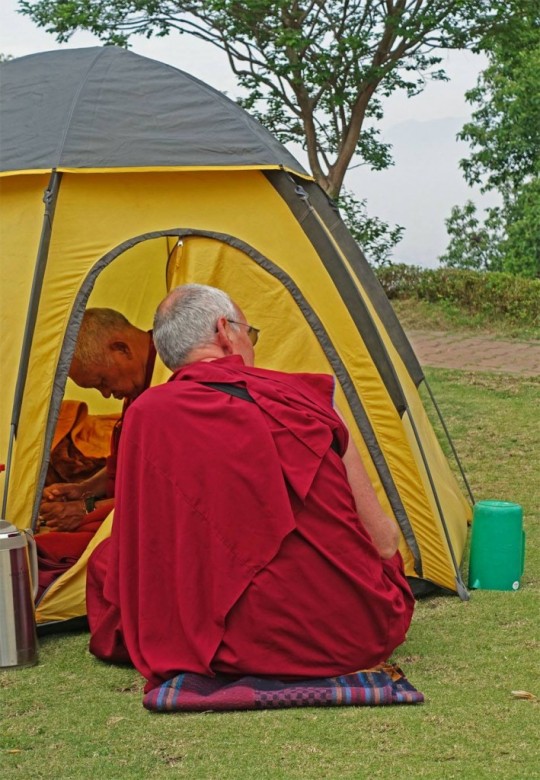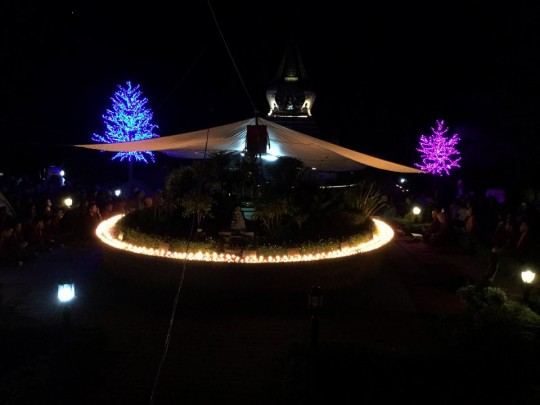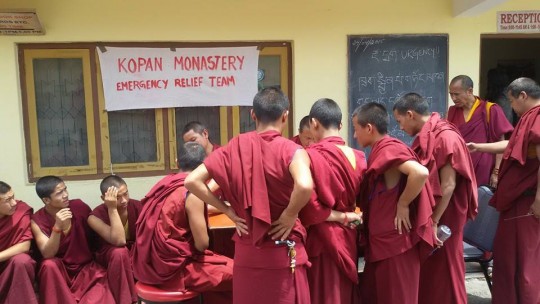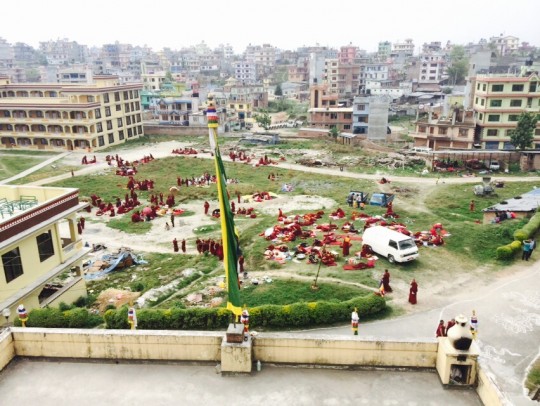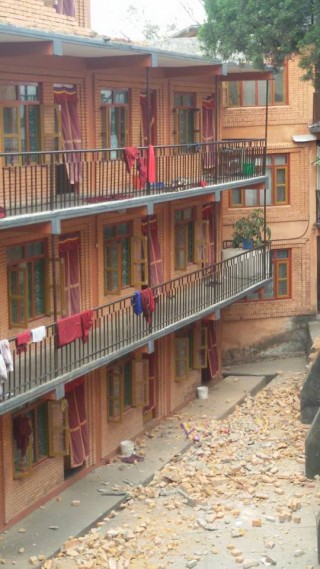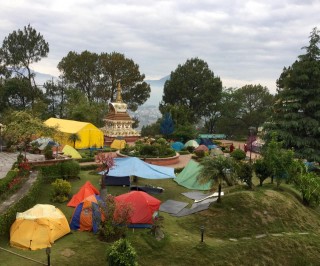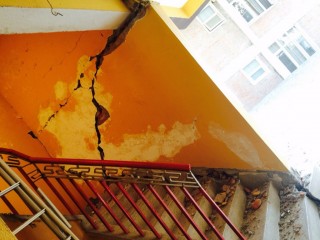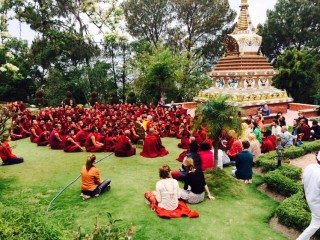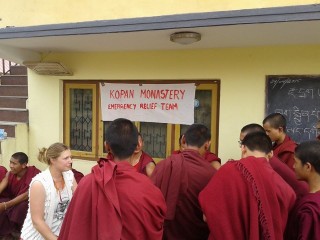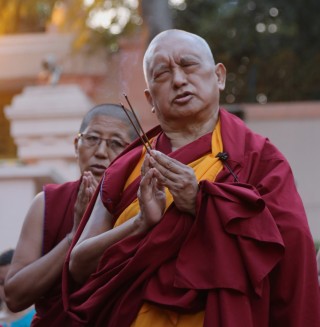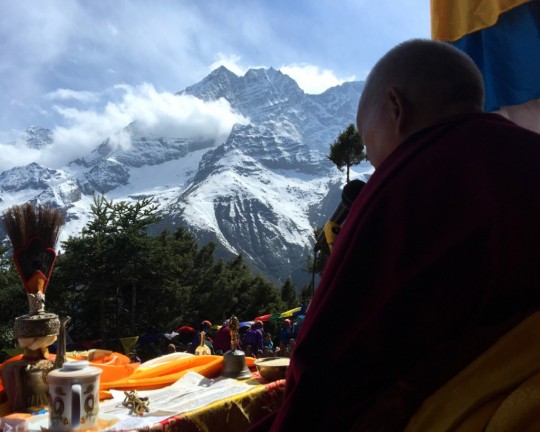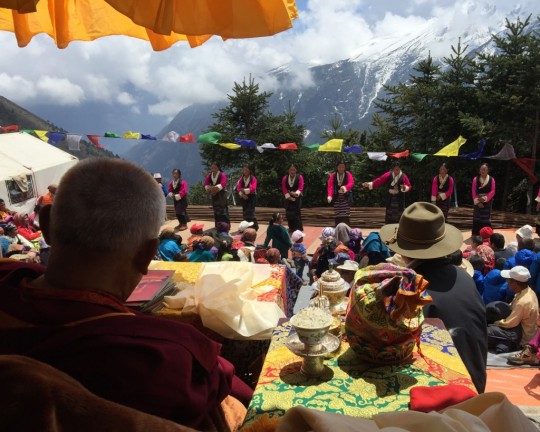- Home
- FPMT Homepage
Foundation for the Preservation of the Mahayana Tradition
The FPMT is an organization devoted to preserving and spreading Mahayana Buddhism worldwide by creating opportunities to listen, reflect, meditate, practice and actualize the unmistaken teachings of the Buddha and based on that experience spreading the Dharma to sentient beings. We provide integrated education through which people’s minds and hearts can be transformed into their highest potential for the benefit of others, inspired by an attitude of universal responsibility and service. We are committed to creating harmonious environments and helping all beings develop their full potential of infinite wisdom and compassion. Our organization is based on the Buddhist tradition of Lama Tsongkhapa of Tibet as taught to us by our founders Lama Thubten Yeshe and Lama Thubten Zopa Rinpoche.
- Willkommen
Die Stiftung zur Erhaltung der Mahayana Tradition (FPMT) ist eine Organisation, die sich weltweit für die Erhaltung und Verbreitung des Mahayana-Buddhismus einsetzt, indem sie Möglichkeiten schafft, den makellosen Lehren des Buddha zuzuhören, über sie zur reflektieren und zu meditieren und auf der Grundlage dieser Erfahrung das Dharma unter den Lebewesen zu verbreiten.
Wir bieten integrierte Schulungswege an, durch denen der Geist und das Herz der Menschen in ihr höchstes Potential verwandelt werden zum Wohl der anderen – inspiriert durch eine Haltung der universellen Verantwortung und dem Wunsch zu dienen. Wir haben uns verpflichtet, harmonische Umgebungen zu schaffen und allen Wesen zu helfen, ihr volles Potenzial unendlicher Weisheit und grenzenlosen Mitgefühls zu verwirklichen.
Unsere Organisation basiert auf der buddhistischen Tradition von Lama Tsongkhapa von Tibet, so wie sie uns von unseren Gründern Lama Thubten Yeshe und Lama Thubten Zopa Rinpoche gelehrt wird.
- Bienvenidos
La Fundación para la preservación de la tradición Mahayana (FPMT) es una organización que se dedica a preservar y difundir el budismo Mahayana en todo el mundo, creando oportunidades para escuchar, reflexionar, meditar, practicar y actualizar las enseñanzas inconfundibles de Buda y en base a esa experiencia difundir el Dharma a los seres.
Proporcionamos una educación integrada a través de la cual las mentes y los corazones de las personas se pueden transformar en su mayor potencial para el beneficio de los demás, inspirados por una actitud de responsabilidad y servicio universales. Estamos comprometidos a crear ambientes armoniosos y ayudar a todos los seres a desarrollar todo su potencial de infinita sabiduría y compasión.
Nuestra organización se basa en la tradición budista de Lama Tsongkhapa del Tíbet como nos lo enseñaron nuestros fundadores Lama Thubten Yeshe y Lama Zopa Rinpoche.
A continuación puede ver una lista de los centros y sus páginas web en su lengua preferida.
- Bienvenue
L’organisation de la FPMT a pour vocation la préservation et la diffusion du bouddhisme du mahayana dans le monde entier. Elle offre l’opportunité d’écouter, de réfléchir, de méditer, de pratiquer et de réaliser les enseignements excellents du Bouddha, pour ensuite transmettre le Dharma à tous les êtres. Nous proposons une formation intégrée grâce à laquelle le cœur et l’esprit de chacun peuvent accomplir leur potentiel le plus élevé pour le bien d’autrui, inspirés par le sens du service et une responsabilité universelle. Nous nous engageons à créer un environnement harmonieux et à aider tous les êtres à épanouir leur potentiel illimité de compassion et de sagesse. Notre organisation s’appuie sur la tradition guéloukpa de Lama Tsongkhapa du Tibet, telle qu’elle a été enseignée par nos fondateurs Lama Thoubtèn Yéshé et Lama Zopa Rinpoché.
Visitez le site de notre Editions Mahayana pour les traductions, conseils et nouvelles du Bureau international en français.
Voici une liste de centres et de leurs sites dans votre langue préférée
- Benvenuto
L’FPMT è un organizzazione il cui scopo è preservare e diffondere il Buddhismo Mahayana nel mondo, creando occasioni di ascolto, riflessione, meditazione e pratica dei perfetti insegnamenti del Buddha, al fine di attualizzare e diffondere il Dharma fra tutti gli esseri senzienti.
Offriamo un’educazione integrata, che può trasformare la mente e i cuori delle persone nel loro massimo potenziale, per il beneficio di tutti gli esseri, ispirati da un’attitudine di responsabilità universale e di servizio.
Il nostro obiettivo è quello di creare contesti armoniosi e aiutare tutti gli esseri a sviluppare in modo completo le proprie potenzialità di infinita saggezza e compassione.
La nostra organizzazione si basa sulla tradizione buddhista di Lama Tsongkhapa del Tibet, così come ci è stata insegnata dai nostri fondatori Lama Thubten Yeshe e Lama Zopa Rinpoche.
Di seguito potete trovare un elenco dei centri e dei loro siti nella lingua da voi prescelta.
- 欢迎 / 歡迎
简体中文
“护持大乘法脉基金会”( 英文简称:FPMT。全名:Foundation for the Preservation of the Mahayana Tradition) 是一个致力于护持和弘扬大乘佛法的国际佛教组织。我们提供听闻,思维,禅修,修行和实证佛陀无误教法的机会,以便让一切众生都能够享受佛法的指引和滋润。
我们全力创造和谐融洽的环境, 为人们提供解行并重的完整佛法教育,以便启发内在的环宇悲心及责任心,并开发内心所蕴藏的巨大潜能 — 无限的智慧与悲心 — 以便利益和服务一切有情。
FPMT的创办人是图腾耶喜喇嘛和喇嘛梭巴仁波切。我们所修习的是由两位上师所教导的,西藏喀巴大师的佛法传承。
繁體中文
護持大乘法脈基金會”( 英文簡稱:FPMT。全名:Found
ation for the Preservation of the Mahayana Tradition ) 是一個致力於護持和弘揚大乘佛法的國際佛教組織。我們提供聽聞, 思維,禪修,修行和實證佛陀無誤教法的機會,以便讓一切眾生都能 夠享受佛法的指引和滋潤。 我們全力創造和諧融洽的環境,
為人們提供解行並重的完整佛法教育,以便啟發內在的環宇悲心及責 任心,並開發內心所蘊藏的巨大潛能 — 無限的智慧與悲心 – – 以便利益和服務一切有情。 FPMT的創辦人是圖騰耶喜喇嘛和喇嘛梭巴仁波切。
我們所修習的是由兩位上師所教導的,西藏喀巴大師的佛法傳承。 察看道场信息:
- FPMT Homepage
- News/Media
-
- Study & Practice
-
-
- About FPMT Education Services
- Latest News
- Programs
- New to Buddhism?
- Buddhist Mind Science: Activating Your Potential
- Heart Advice for Death and Dying
- Discovering Buddhism
- Living in the Path
- Exploring Buddhism
- FPMT Basic Program
- FPMT Masters Program
- FPMT In-Depth Meditation Training
- Maitripa College
- Lotsawa Rinchen Zangpo Translator Program
- Universal Education for Compassion & Wisdom
- Online Learning Center
-
- Prayers & Practice Materials
- Overview of Prayers & Practices
- Full Catalogue of Prayers & Practice Materials
- Explore Popular Topics
- Benefiting Animals
- Chenrezig Resources
- Death & Dying Resources
- Lama Chopa (Guru Puja)
- Lama Zopa Rinpoche: Compendium of Precious Instructions
- Lama Zopa Rinpoche: Life Practice Advice
- Lama Zopa Rinpoche Practice Series
- Lamrim Resources
- Mantras
- Prayer Book Updates
- Purification Practices
- Sutras
- Thought Transformation (Lojong)
- Audio Materials
- Dharma Dates - Tibetan Calendar
- Translation Services
- Publishing Services
- Ways to Offer Support
- Prayers & Practice Materials
-
- Teachings and Advice
- Find Teachings and Advice
- Lama Zopa Rinpoche Advice Page
- Lama Zopa Rinpoche: Compendium of Precious Instructions
- Lama Zopa Rinpoche Video Teachings
- ༧སྐྱབས་རྗེ་བཟོད་པ་རིན་པོ་ཆེ་མཆོག་ནས་སྩལ་བའི་བཀའ་སློབ་བརྙན་འཕྲིན།
- Podcasts
- Lama Yeshe Wisdom Archive
- Buddhism FAQ
- Dharma for Young People
- Resources on Holy Objects
- Teachings and Advice
-
-
*If a menu item has a submenu clicking once will expand the menu clicking twice will open the page.
-
-
- Centers
-
- Teachers
-
- Projects
-
-
-
-
*If a menu item has a submenu clicking once will expand the menu clicking twice will open the page.
-
-
- FPMT
-
-
-
-
-
Tibetan Buddhism teaches you to overcome your dissatisfied mind, but to do that you have to make an effort. To put our techniques into your own experience, you have to go slowly, gradually. You can’t just jump right in the deep end. It takes time and we expect you to have trouble at first. But if you take it easy it gets less and less difficult as time goes by.
Lama Zopa Rinpoche
-
-
-
- Shop
-
-
-
The Foundation Store is FPMT’s online shop and features a vast selection of Buddhist study and practice materials written or recommended by our lineage gurus. These items include homestudy programs, prayers and practices in PDF or eBook format, materials for children, and other resources to support practitioners.
Items displayed in the shop are made available for Dharma practice and educational purposes, and never for the purpose of profiting from their sale. Please read FPMT Foundation Store Policy Regarding Dharma Items for more information.
-
-
Lama Zopa Rinpoche News
29
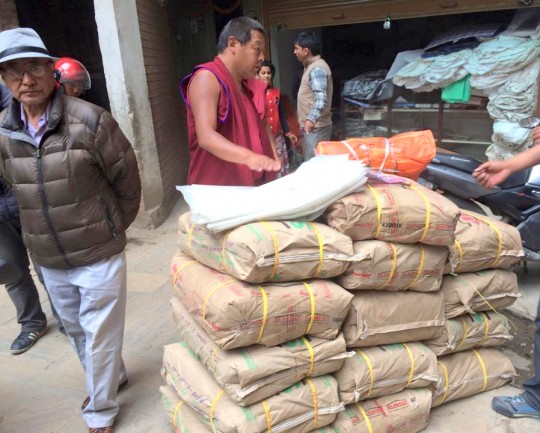
Sangey Sherpa, Lama Zopa Rinpoche’s brother and director of Lawudo Gompa and Retreat Centre, and Ven. Nyima Tashi with supplies that are being flown up to Thame, which is near Lawudo in the Solu Khumbu district, Kathmandu, Nepal, April 29, 2015
29 April 2015, 1 p.m. Kathmandu
From Ven. Roger Kunsang:
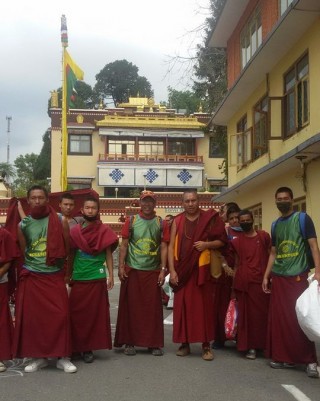
Emergency relief volunteers, some will be traveling to Thame with food and shelter for families there, Kopan Monastery, April 29, 2015. Photo by Tara Melwani.
So many people have been affected and many seriously. It’s an impossible job to help everyone at the same time.
The government with the support of many overseas and local organizations are prioritizing the worst-affected areas with what resources are available. One of the key issues is the remoteness and high altitude of many of the areas … and being cut off by landslides.
Rinpoche is focusing on Thame, his birthplace [near Lawudo Gompa in the Solu Khumbu district], and some of the other nearby areas to Lawudo, which is Rinpoche’s “local community,” so to speak.
In this area, there are about 100 families (our estimate so far, telephones are not working as yet, so communication is very difficult up there and still also hard in Kathmandu valley) who have lost their homes, and a few have been killed. They are living under plastic sheets huddled together as it is very cold and wet. There are still a few house standing, but people are too scared to go into them in case there is an aftershock. Food is running out.
Today we are organizing 100 food and shelter packages (basic food and a tent for each family). Each package is US$500, so a total of $50,000. This money is the first disbursement from FPMT’s Nepal Earthquake Support Fund.
Thank you for everyone’s support thus far. There is definitely more assistance required. So if you can help, it is greatly needed. And we are now able to directly offer immediate help.
We hope we can get a helicopter (all are commandeered by the government) to make several trips up to Thame, which is remote and at about 4,000 meters [13,100 feet]. This will help them get through the initial stage until, we hope, the bigger agencies and governments arrive with aid.
Most of the Kopan monks and nuns are now out helping in the affected areas, especially trying to get water and basic food to people. Some of the Westerners who are staying here are with them helping. The monks and nuns at Kopan are often from remote areas and some are trying to get back to help the older people. A lot of remote areas just have older people living there as the young come into Kathmandu to find work or go overseas for work.
There has been a lot of confusion and it’s very disorganized. That will improve. In the meantime, lives are lost and others are in need or hurt badly. Especially in difficult to reach mountainous regions, it’s really bad.
In the evenings Rinpoche with the Sangha are doing many prayers and pujas for those who have died and hurt as well as pujas to prevent further aftershocks.
One of the difficulties is getting people back to work. People are too scared to go into buildings in case there are more aftershocks. Shops don’t open and people can’t buy food and other necessities. Or the workers have left to help their families in outlying areas. Still soon they will be forced to open as people mostly live day to day. They have to work to buy food. Still many are living in tents in open areas.
People really got scared due to how violent the main two earthquakes were. Most people who died or were seriously hurt were killed or injured due to badly built buildings or very old buildings collapsing on them. I had a wall collapse on me while having a meeting. And I was lucky to receive just minor cuts and bruises, nothing really compared to many others.
Kopan Monastery and Nunnery have suffered a lot of damage. The engineers will come soon and let us know the extent and seriousness of the damage.
Today Rinpoche is moving back into the main monastery building. Hopefully that means no more serious aftershocks. And overhead there is the constant sound of helicopters shuttling back and forth with injured people or supplies. It’s constant as there are smaller light aircraft doing the same.
Jimmy Grant visited Thame not long after the earthquake. Here is his eyewitness account of the area, shared in an email to his father:
Yesterday [April 28, 2015], I went to visit Thame, in the hope of contacting you and spending some time at the lodge. I was absolutely heartbroken by what I saw and what’s worse is that Thame, from what I have seen, has yet to receive any assistance from anyone. I started talking to a young boy named Mingma, who took me to his house. You can see him in one of the pictures attached. I also met the little girl you can see in another picture near her home. The lodge is still standing, but has some serious damage. I wouldn’t stand inside of it, that’s for sure. Oh and Lama Zopa Rinpoche’s house is pretty well completely gone.

Young girl stands next to a collapsed home in Thame, Solu Khumbu district, Nepal, April 28, 2015. Photo by Jimmy Grant.
For the latest updates and news from Kopan Monastery and other FPMT centers and projects in Nepal affected by the earthquake, visit our “Updates from Nepal after the Earthquake” page:
https://fpmt.org/nepal-earthquake/
To learn more and offer support to the Nepal Earthquake Support Fund visit:
https://fpmt.org/support/socialservices/
For “Prayers and Practice for Earthquake in Nepal,” see:
https://fpmt.org/edu-news/prayers-and-practices-for-earthquake-in-nepal/
You can receive an email daily digest of news from FPMT.org, including our updates from Nepal, by signing up at this address:
https://fpmt.us6.list-manage.com/subscribe?u=97e3ebb09472d09e0e699efd3&id=b248a1a45e
More information, photos and updates about FPMT spiritual director Lama Zopa Rinpoche can be found on Rinpoche’s webpage. If you’d like to receive news of Lama Zopa Rinpoche via email, sign up to Lama Zopa Rinpoche News.
- Tagged: humanitarian aid, lama zopa rinpoche, lawudo, nepal earthquake, nepal earthquake support fund, social service, thame
- 0
28
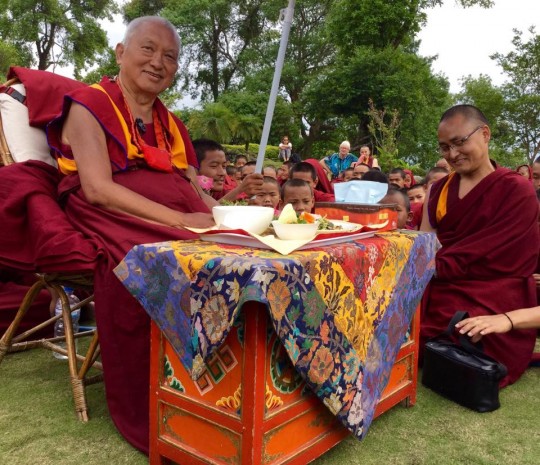
Lama Zopa Rinpoche in garden at Kopan Monastery on the day after the earthquake, Nepal, April 25, 2015. Photo by Ven. Sarah Thresher.
Phil Hunt, coordinator for the Animal Liberation Sanctuary, a project of Kopan Monastery, was enroute to Nepal when the earthquake struck on Saturday, April 25. He arrived safely in Kathmandu on Sunday, April 26, and traveled up to Kopan Monastery.
“At Kopan Monastery the monks and international visitors were outside, most gathered at the open stupa garden in a mini tent city,” Phil wrote for the organization Tree of Compassion. “Damage was minimal but several of the older buildings had some serious cracking and slipping and were no-go areas.
“I found Pema the Animal Liberation Sanctuary manager and he confirmed our earlier email notification that the animals were fine and the structures unharmed. I visited the cows, who had just started to come into the shed, including Kalden, the calf who we rescued from the street in January and who had a most amazing recovery from terrible wounds after being attacked by dogs.
“I put my bags away and found a place in a tent for the night ahead. Lama Zopa Rinpoche, the founder and spiritual director of the monastery and the international Buddhist organization FPMT, not to mention the rescuer of the majority of the animals at the ALS, was sitting on a chair under a tree talking to visitors and later gave a teaching. …”
Phil shared a short video of Rinpoche and the enlightenment garden at Kopan on the day after the earthquake on YouTube:
https://youtu.be/A1tus0YZdwQ
For the latest updates and news from Kopan Monastery and other FPMT centers and projects in Nepal affected by the earthquake, visit our “Updates from Nepal after the Earthquake” page:
https://fpmt.org/nepal-earthquake/
To learn more and offer support to the Nepal Earthquake Support Fund visit:
https://fpmt.org/support/socialservices/
For “Prayers and Practice for Earthquake in Nepal,” see:
https://fpmt.org/edu-news/prayers-and-practices-for-earthquake-in-nepal/
You can receive an email daily digest of news from FPMT.org, including our updates from Nepal, by signing up at this address:
https://fpmt.us6.list-manage.com/subscribe?u=97e3ebb09472d09e0e699efd3&id=b248a1a45e
More information, photos and updates about FPMT spiritual director Lama Zopa Rinpoche can be found on Rinpoche’s webpage. If you’d like to receive news of Lama Zopa Rinpoche via email, sign up to Lama Zopa Rinpoche News.
- Tagged: kopan monastery, lama zopa rinpoche, nepal earthquake, video
- 0
28
One’s Self-Cherishing Mind
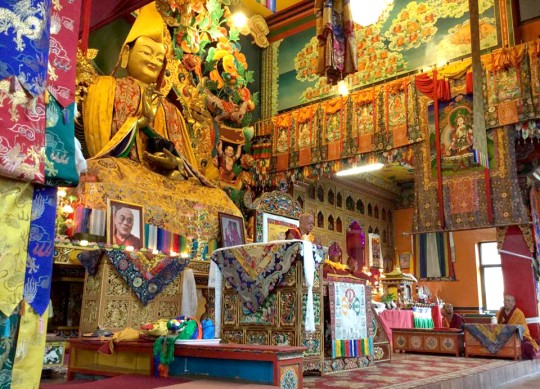
Lama Zopa Rinpoche teaching in Kopan Monastery’s main gompa, Nepal, April 28, 2015. Photo by Ven. Sarah Thresher.
28 April 2015, 9 p.m. Kathmandu time
From Ven. Roger Kunsang:
Services have started to come back. Kopan just got electricity and internet just now.
Rinpoche taught this afternoon, but still no initiation. Rinpoche taught mostly on emptiness and how earthquakes and Chöd are similar– they raise fear and you can use that. Rinpoche also taught, “The earthquake came from one’s own self-cherishing mind. … So take all the blame and put it on one’s own self-cherishing. … Don’t blame outside, don’t point the finger outside to others.”
Rinpoche is keen to help Thame, the town where he was born [near Mount Everest in the Solu Khumbu region], in particular, two families he has connections with. And so he sent US$3,500 for both families to help them with a tent and food. Through a lama there who does all the pujas for the dead of the poor families, we are trying to identify the families who now need help with food and tents. (Nobody wants to stay inside buildings.) We are going to try and focus on helping poor families in the area who have lost their homes. [FPMT International Office has established the Nepal Earthquake Support Fund to support these efforts.]
Still people are camped out and won’t go into their homes, if still standing. They are too scared another tremor will come. People were really freaked out with the big aftershock quakes and their effects.
I’m inside while writing this and am ready to run if tremors happen. That’s happened a few times and quite freaky as the building really shakes and trembles! And we really don’t know if the building will come down or not!
Lots of commercial flights coming in now to the airport, so I think things should be more settled by the time we need to leave. [Rinpoche’s teaching tour begins in New Zealand next week.]
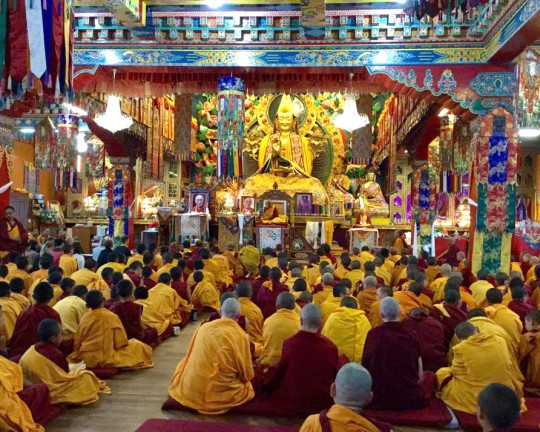
Lama Zopa Rinpoche teaching in the gompa at Kopan Monastery, Nepal, April 28, 2015. Photo by Ven. Sarah Thresher.
From Ani Fran, who works as a manager at Kopan Monastery:
The damage is heartbreaking [at Kopan], especially the Chenrezig gompa. It is possible it will have to be pulled down and rebuilt.
But we are so lucky that Rinpoche is here, camping out with everybody else. Can you believe it!
For the latest updates and news from Kopan Monastery and other FPMT centers and projects in Nepal affected by the earthquake, visit our “Updates from Nepal after the Earthquake” page: https://fpmt.org/nepal-earthquake/
To learn more and offer support to the Nepal Earthquake Support Fund visit:
https://fpmt.org/support/socialservices/
For “Prayers and Practice for Earthquake in Nepal,” see:
https://fpmt.org/edu-news/prayers-and-practices-for-earthquake-in-nepal/
- Tagged: kopan monastery, lama zopa rinpoche, nepal earthquake
- 0
28
28 April 2015, 8 p.m. Kathmandu time
From Kopan Monastery staff:
Updated from day two, mid-day (yesterday)
As on the first day, we saw all the people either on the road or in open places. Most of them are staying under tents that are not waterproof. Most of them are asking for waterproof tents rather than for food and water. The government announced the distribution of tents, but they are still stuck somewhere, and foreign aid tents have not yet arrived. For the time being, food, water and medicine seem OK in the valley. The most relieving thing is that some people started to open their shops so that people can buy whatever they need.
We found some Red Cross rescue teams that are patrolling around. We met the team officer and introduced ourselves as volunteers from Kopan Monastery. They looked so tired but became so excited to hear about our help. We gave them our contact number and told them to call us any time for any help. While we were waiting for others to report at Kopan, Lama Zopa Rinpoche began to give pre-initiation teachings to monks and guests.
After dinner all of us (monks and laypeople) gathered at Ri-gyab to pray for those people who died in this tragedy. Another aftershock came during the puja. Later we found out that it was a 4.5 magnitude earthquake. However, we concluded the session with extensive dedication prayers around 10:30 p.m. Finally, we are learning that the most affected areas are outside the valley, where people can’t get to easily. In these areas, the best help can be provided only with helicopters.
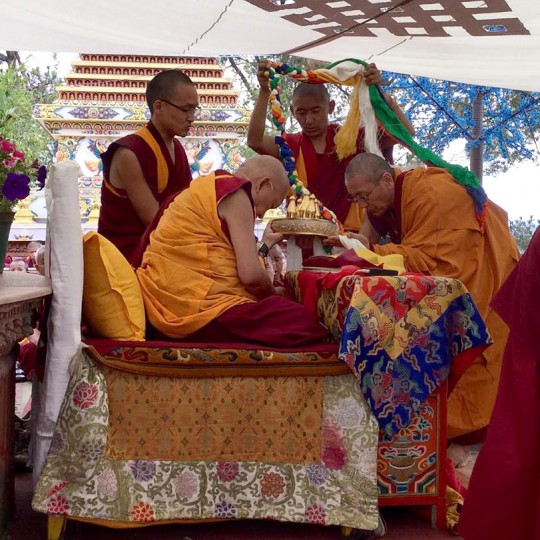
Lama Zopa Rinpoche accepting body, speech and mind mandala offering from Khen Rinpoche Geshe Chonyi, abbot of Kopan Monastery, Nepal, April 27, 2015. Photo by Ven. Sarah Thresher.
27 April 2015, midnight Kathmandu time
From Ven. Sarah Thresher:
Lama Zopa Rinpoche taught yesterday afternoon in the Enlightenment Garden at Kopan. He gave the oral transmission of Daily Meditation. This evening, prayers and light offerings were made for those who have died and all sentient beings. At this time there is so much that is needed in this devastated country. Right now what the monastery can best do is pray for those who have died. There are still aftershocks and still monks and lamas sleeping outside. Kopan will slowly run out of food and water, so they are canceling the next course.
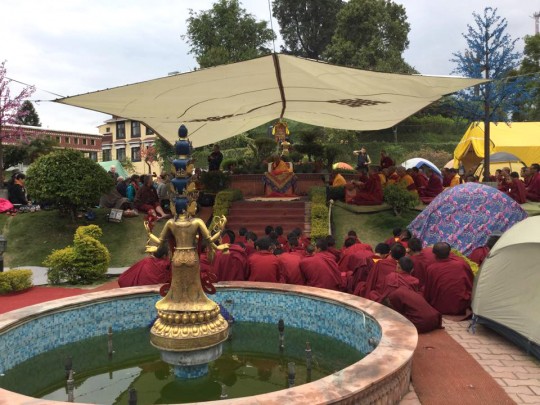
Lama Zopa Rinpoche teaches from under a tent in the Enlightenment Garden at Kopan Monastery, Nepal, April 27, 2015. Photo by Ven. Sarah Thresher.
VIDEO: Drone Films Bird’s-Eye View of Nepal Quake Devastation from NBCNews.com
For the latest updates and news from Kopan Monastery and other FPMT centers and projects in Nepal affected by the earthquake, visit our “Updates from Nepal after the Earthquake” page: https://fpmt.org/nepal-earthquake/
To learn more and offer support to the Nepal Earthquake Support Fund visit:
https://fpmt.org/support/socialservices/
For “Prayers and Practice for Earthquake in Nepal,” see:
https://fpmt.org/edu-news/prayers-and-practices-for-earthquake-in-nepal/
- Tagged: kopan monastery, nepal earthquake
- 0
27
27 April 2015, 10 p.m. (Kathmandu time)
From Ven.Roger Kunsang:
All at Kopan Monastery are spending the third night sleeping outside. Most people in the area are doing the same. People are very scared to sleep inside the houses as many homes are poorly constricted and damaged.
Today Rinpoche heard that half of the houses in Thame, which is Rinpoche’s birthplace in the Solu Khumbu region of Nepal, have been completely destroyed. Rinpoche immediately offered to sponsor tents and food to help the people in Thame.
I have asked FPMT International Office to set up a Nepal Earthquake Support Fund. This fund will begin the task of supporting Kopan Monastery and Nunnery and other affected FPMT centers in the area with any initial emergency needs, and then later on, will offer ongoing support for rebuilding. We will also use these funds to help others, as in the example of Thame.
This evening Rinpoche did prayers for all those who have died or are injured with all the Sangha of Kopan. Rinpoche gave the motivation for Most Secret Hayagriva initiation and is planning to give the initiation tomorrow.
Thank you all for your support of prayers and offering support to the Nepal Earthquake Support Fund.
27 April 2015, 8 p.m. (Kathmandu time)
From Kopan Monastery staff:
Nepal chaos by nature (Report from day one)
It’s the biggest tragedy from a powerful earthquake to happen in Nepal in 82 years. It was at 11:54 a.m., just after the lunch here at Kopan Monastery. Afterwards, we learned that it measured 7.9 magnitude, which is considered as very strong. It is officially report that more than two thousands people died within 3-4 hours from the initial quake. Fortunately, it hit during the daytime, otherwise the number of human casualties may be doubled.
At first there’s nothing much to do except stay away from the any building. All the monks moved back to Ri-gyab. Rinpoche started to pray along with monks, while we were looking around trying to find any casualties. We found that Chenrezig gompa and old guest room got pretty bad damages. All the staff members are busy sorting out problems. Tents were prepared for Rinpoche, monks and all the guests.
As soon as we came to know about the many tragedies that had happened in the city, we setup an Emergency Relief Team. The first thing that came into our minds to do was to donate blood. We went off to the Red Cross blood bank of Nepal to check. On the way, we witnessed on the roads and heard from the radio that many people were dead.
At night, all the people across the city are camped either in the road or open places. There is no light. All the medium of communication are jammed. You can feel the fear from people’s faces. Hospitals are full of corpses. Helicopters are flying all over the city. The government announced to stay away from any tall buildings or the like. It was declared five days off for all the schools across the country. It’s so creepy to see the affected area. Many buildings got cracked. Some might go down if it shakes again. People across the country are scared and tense. The government announced relief teams are on the way and international teams are arriving.
As we arrived at the Red Cross center. They were so happy to receive our help. At once, they asked us to bring people to donate. We came back to Kopan and made a list of donors. There were more than 40 people and we sent 10 of them as the first group. As first group reached the Red Cross, they told us to stay as standby. So, the first group went to Bír-Hospital and donate blood and whatever we had — medicine, bandages and gloves. The rest of the group stayed back as a backup. The mild shaking kept coming and one more strong shock came at 1:00 p.m. with rain and thunder.
Report from day two
The second day [after the earthquake] started with mild shaking around 8:00 a.m. After lunch we had an emergency meeting as we had come to know that many people were having a hard-time. We, along with our friends from overseas, decided to give any help to needed areas. A Search Team was setup and went in all directions to find out what and where we are needed.
By tomorrow we could be very busy helping. We thank all helping hands from our friends all over the world. Will update…
Additional update from Kopan:
The “Discover Buddhism” course scheduled to begin on May 3 at Kopan has been CANCELLED.
Other updates on courses will be shared as they become available.
To read all of the latest updates and news from FPMT.org on the Nepal earthquake, visit our “Updates from Nepal after the Earthquake” page:
https://fpmt.org/nepal-earthquake/
To learn more and offer support to the Nepal Earthquake Support Fund visit:
https://fpmt.org/support/socialservices/
For “Prayers and Practice for Earthquake in Nepal,” see:
https://fpmt.org/edu-news/prayers-and-practices-for-earthquake-in-nepal/
For background on FPMT’s activities in Nepal over the years, see “Nepal: ‘The Most Holy Place in the World'” from Mandala January-March 2013:
https://fpmt.org/mandala/archives/mandala-for-2013/january/nepal-the-most-holy-place-in-the-world/
- Tagged: kopan monastery, lama zopa rinpoche, nepal earthquake
- 0
25
Updates from Ven. Roger Kunsang at Kopan Monastery:
27 April 2015, 10am (Kathmandu time) Lama Zopa Rinpoche, all the Kopan monks and nuns (approximately 800) and about 25 foreigners who are at Kopan slept outside for a second night, tremors continued, many people piled in tents and outside, trying to keep dry from the rain. No one wants to stay inside the buildings while tremors are still happening. The situation is unclear, so we are conserving water and food.
Many of the 800 monks and nuns are very young (7-15 years old) so the older sangha are trying to look after them, help them not to be scared and try to answer their questions on why the earth moves.
Please continue to do prayers for all those affected.
From Ven.Sarah Thresher: From shortly after the earthquake began the main center at Kopan has been the garden of enlightenment where the big stupas of Geshe lama Konchog and Lama lhundrup are built. Rinpoche has been living there, daytime and nighttime, leading prayers, teaching, greeting people who come up, keeping people relaxed and in a positive state of mind. The very first day Rinpoche told us there is no point being worried and afraid, we must pray. So we have been doing prayers to control the earthquake, prayers for the people who have died, prayers to destroy the self-cherishing and self-grasping minds from where the negative karma as arise that cause all the suffering. With Rinpoche always present and the two great stupas as well, it feels like we are in a tranquil oasis of calm protected by all the BUDDHAS.
Last night was cold and wet and many more people slept in the tents. I heard they could hear Rinpoche chanting mantras loudly all night for sentient beings, for all sentient beings.
26 April 2015, 7pm (Kathmandu time) Lama Zopa Rinpoche and all the monks, nuns and students staying at Kopan are still sleeping outside (some in tents) as there continue to be aftershocks, some as big as 6.7.
There is still no internet, phone lines jammed and no electricity (although once a day generator at Kopan is turned on so phones can be charged).
Rinpoche is well and has been in the Kopan garden all day doing prayers, right now doing the King of Prayers dedicated for all those who have died in the earthquake.
Earlier today Rinpoche requested the monks and nuns to recite the Golden Light Sutra many times to prevent the continuing aftershocks and also the recitation of the Kangyur.
There is substantial damage to Kopan Monastery and Nunnery, a number of buildings are seriously damaged.
Ven.Sarah Thresher reports: The earthquake happened yesterday around lunchtime. It was Saturday and a holiday. Many people were gone. We were in the dining room when everything started to shake and most people ran out. In Rinpoche’s room there are many things and they were falling down. Rinpoche was sitting in the main room doing tonglen, taking the suffering of others and giving happiness. Rinpoche said this is the best practice, lojong, using whatever negative situation arises to destroy the self cherishing. After a while the attendants carried Rinpoche down to the stupa garden and everyone gathered around him. For hours Rinpoche led us in prayers. We did the prayers for earthquakes and we did tonglen. As we prayed the earth was shaking, sometimes quite strongly. Then Rinpoche began to teach and also give lungs for thought transformation practice. We were all so fortunate that Rinpoche, Osel and Khen Rinpoche were here along with the senior monks who took full control of the situation. Amongst the damage at Kopan is broken pipes. The internet also became very scarce and electricity off. We were fortunate we could get dinner and then many people slept outside. Rinpoche also was outside.
This morning again people were outside. The monks did prayers and also relaxed a bit. Rinpoche had lunch out in the garden and we listened to chanting and spent time with him. This evening Rinpoche led prayers for all the people who died until it started to rain heavily. There are still tremors and there has been a lot of destruction and deaths. But at Kopan we are all safe. Now it is raining and people are outside. Thankyou all for your concern and prayers.
Please continue to do prayers for all those affected.
26 April 2015, 10.30am: Last night everyone slept outside, there were many aftershocks. There is substantial damage to a number of buildings at both Kopan Monastery and Nunnery (the Chenrezig gompa, guest house, Norbalinka, Nunnery old gompa and kitchen) exact details will come later. Kopan Monastery and Nunnery will need our support soon. Currently there is no electricity, no internet and limited lines open for calls. So this is just a short update.
25 April 2015, 4pm: Lama Zopa Rinpoche, Tenzin Osel Hita and all at Kopan Monastery and Nunnery are fine after the strong earthquake that hit Nepal today. There has been some damage in Kopan (to buildings). Rinpoche’s sister – Ani Ngawang Samten and those in Lawudo are also fine (also some damage).
Please hold all those who have been affected by the earthquake in your prayers.
Lama Zopa Rinpoche has given advice on practices to do after earthquakes and also always recommends Medicine Buddha practice, Golden Light Sutra and King of Prayers.
24
Practice Patience!
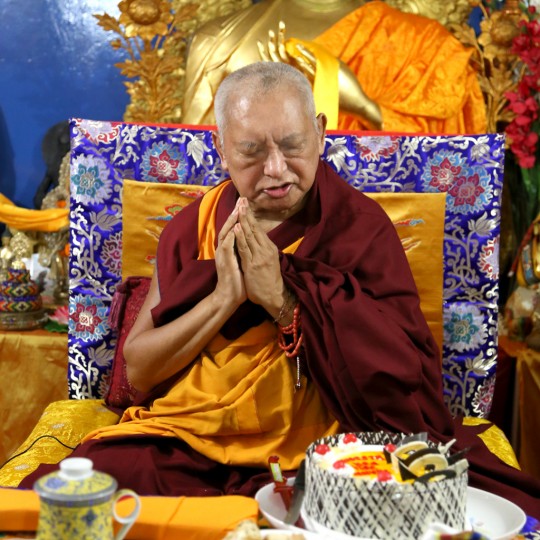
Lama Zopa Rinpoche at Root Institute, Bodhgaya, India, February 2015. Photo by Ven. Thubten Kunsang.
Lama Zopa Rinpoche was at Root Institute in Bodhgaya, India, during February and March 2015. On March 20, Ven. Roger Kunsang shared this on his Twitter page:
Lama Zopa; we need to cherish the one who is causing us most difficulties, see as most kind! … practice patience!
Ven. Roger Kunsang, Lama Zopa Rinpoche’s assistant and CEO of FPMT Inc., shares Lama Zopa Rinpoche’s recent pith sayings on Ven. Roger’s Twitter page. (You can also read them on Ven. Roger’s Facebook page.)
More information, photos and updates about FPMT spiritual director Lama Zopa Rinpoche can be found on Rinpoche’s homepage. If you’d like to receive news of Lama Zopa Rinpoche via email, sign up to Lama Zopa Rinpoche News.
- Tagged: lama zopa rinpoche, twitter
- 0
23
Motivation Is More Important than Korwa
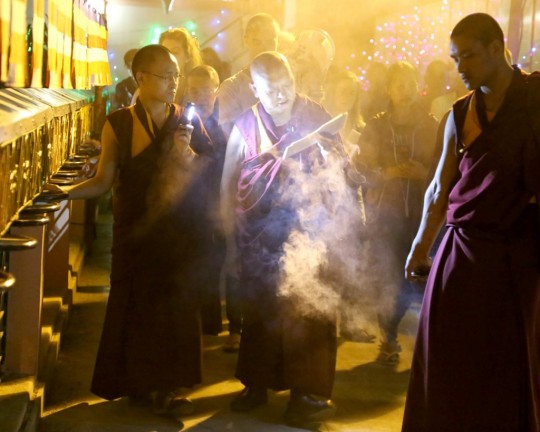
Lama Zopa Rinpoche at the Mahabodhi Stupa, Bodhgaya, India, February 2015. Photo by Ven. Thubten Kunsang.
When Lama Zopa Rinpoche stays at Root Institute in Bodhgaya he frequently goes to circumambulate the Mahabodhi Stupa. Long-time student Ven. Sarah Thresher recounts an excursion to the stupa in 2014 when Rinpoche’s actions taught an important lesson.
“The day before Losar we had a lot of rain on and off all day. Rinpoche mentioned in the early morning that he would like to go to the stupa to offer robes,” Ven. Sarah wrote. “Twelve hours later when the driver and everyone else had given up on the trip, Rinpoche got up and started walking to the car. With just over an hour till the stupa closed and everyone caught by surprise, we drove off.
“Rinpoche gave a teaching to the driver, who is Spanish, about how to solve the problems in Spain – people have to change their minds and realize happiness does not come by changing things outside but from the mind, by changing the mind.
“When we arrived, Rinpoche took a few steps towards the stupa and then began to teach on the importance of generating a bodhichitta motivation. By this time it was raining again, but a small group began to gather around Rinpoche standing in the middle of the walkway still a short walk from the stupa entrance. Rinpoche gave a beautiful and inspiring teaching on how we simply do not realize how amazing bodhichitta is, how amazing it is to take responsibility for the happiness of every single ant, mosquito, fly, bug, etc., for all living beings. Not just saying blah blah blah, but really feeling this bodhichitta in the heart.
“Then Rinpoche moved to the subject of emptiness and the correct view according to the Prasangika school. Then back to bodhichitta again as more people joined to listen – Tibetans, Westerners, Indians, Chinese, Vietnamese, Mongolians and so on, monks, nuns and lay people.
“As the talk continued I had the feeling we were not actually going to do any korwa (circumambulation); the bodhichitta motivation and intention were more important. But with 20 minutes left till the stupa closed, Rinpoche began walking towards the main gate, which by now was closed. A Vietnamese nun asked the security guards to let us in for five minutes. Miraculously they pulled back the gate. We walked in at high speed and around the stupa with Rinpoche pausing from time to time in the prayers to lead us in chanting or give some more teaching.
“As we finished the korwa and Rinpoche stood by the gate to dedicate, Tsoknyi Rinpoche appeared and came up to greet him. They chatted for a while and walked out together. Tsoknyi Rinpoche accompanied Rinpoche and entourage to the car and then watched as they all drove off.”
Learn more about Lama Zopa Rinpoche, spiritual director of the Foundation for the Preservation of Mahayana Tradition (FPMT), and Rinpoche’s vision for a better world. Sign up to receive news and updates.
- Tagged: bodhgaya, kora, lama zopa rinpoche, mahabodhi stupa, ven. sarah thresher
- 0
22
Lama Zopa Rinpoche Gives Long-life Initiation to 1,000 Sherpas
Lama Zopa Rinpoche gave the Amitabha long-life initiation to about 1,000 Sherpa people at Lawudo Gompa and Retreat Centre on Tuesday, April 21. Before the initiation, Sherpa women offered a dance to Rinpoche. Lawudo is in the Solu Khumbu region of Nepal, which is home to the Sherpa, and Lama Zopa Rinpoche was born not far from Lawudo. Rinpoche’s previous incarnation Lawudo Lama Kunsang Yeshe meditated in a cave at Lawudo for 20 years. Rinpoche’s last visit to Lawudo was in 2008.
More information, photos and updates about FPMT spiritual director Lama Zopa Rinpoche can be found on Rinpoche’s webpage. If you’d like to receive news of Lama Zopa Rinpoche via email, sign up to Lama Zopa Rinpoche News.
- Tagged: lama zopa rinpoche, lawudo
- 0
21
Reading Sutras Has So Much Meaning
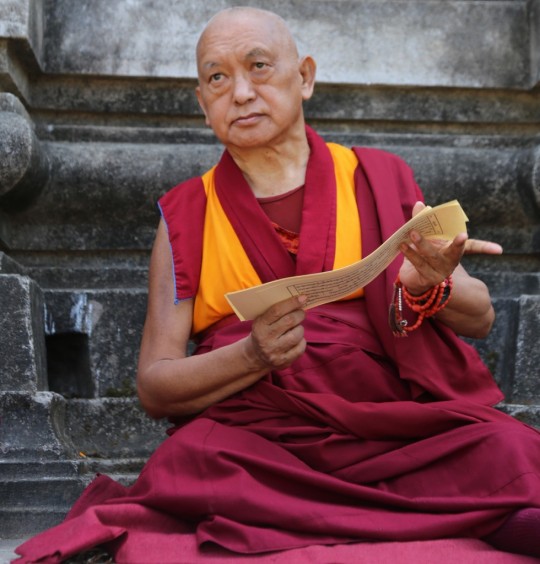
Lama Zopa Rinpoche at the Mahabodhi Stupa, Bodhgaya, India, March 2015. Photo by Ven. Thubten Kunsang.
“I am very happy to hear that you immediately rushed to read the sutras. That made me so extremely happy. That means you are truly a very devoted student, maybe not quite truly existent. Please keep reading the sutras, even one line or one page a day. It has so much meaning,” Lama Zopa Rinpoche wrote to a student, who had written to Rinpoche after he sent her three sutras (the Sutra of Golden Light, the Sanghata Sutra, and Vajra Cutter Sutra).
“Reading the sutras will help you so much. It is the easiest way to direct your life toward enlightenment and toward enlightening all sentient beings, so it has so much benefit, even benefit for your nose.”
FPMT Education Services has created the “Sutras” webpage, which is full of links to various sutra texts and advice from Lama Zopa Rinpoche on reading sutras plus other resources: https://fpmt.org/education/prayers-and-practice-materials/sutras/
Read more advice from Rinpoche on sutras in “Lama Zopa Rinpoche’s Online Advice Book,” part of the Lama Yeshe Wisdom Archive. The text above can be found at: http://bit.ly/various-sutras
Learn more about FPMT spiritual director Lama Zopa Rinpoche and his beneficial activities by visiting Rinpoche’s webpage, where you will find links to Rinpoche’s schedule, new advice, recent video, photos and more.
- Tagged: lama zopa rinpoche, sutras
- 0
20
Destroying Delusions
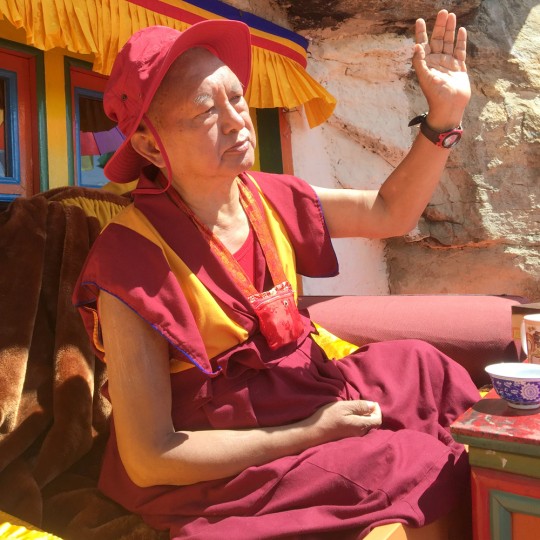
Lama Zopa Rinpoche describing some of his ideas for Lawudo Gompa and Retreat Centre, Nepal, April 2015. Photo by Ven. Roger Kunsang.
Lama Zopa Rinpoche offered the following advice on the value of retreat during lunchtime at one of His Holiness the Dalai Lama’s teachings on “The Wheel of Sharp Weapons”:
You should always remember retreat means making war on delusions. You have to always remember this – this is inner war, but this is a one-time war. Once you defeat delusion by eliminating the cause, the seed of delusion, by actualizing the remedy, the path, it doesn’t come back again; once the seed is removed, delusion never comes back, so this is just a one-time war. The outside, external wars are endless, because you have to fight them again and again.
In Shantideva’s Bodhisattvacaryavatara, he mentions that the outside enemy never ends, never finishes, however much you are able to kill him or her. Shantideva used the example that if the whole earth is covered by thorns, there is not enough leather to cover the whole earth with leather, but if you have leather under your foot, it’s like the whole earth is covered by leather. Shantideva said that the meaning of this is that once the inner enemy, the delusions are destroyed, all the outside enemies are destroyed.
You can read more about this topic from Lama Zopa Rinpoche on the Lama Yeshe Wisdom Archive‘s “Retreat Advice” page: https://www.lamayeshe.com/index.php?sect=article&id=326#sthash.Y9xAoI1w.dpuf/.
More information, photos and updates about FPMT spiritual director Lama Zopa Rinpoche can be found on Rinpoche’s webpage. If you’d like to receive news of Lama Zopa Rinpoche via email, sign up to Lama Zopa Rinpoche News.
- Tagged: lama zopa rinpoche, retreat
- 0
17
Making Homage to the Relics [Video]
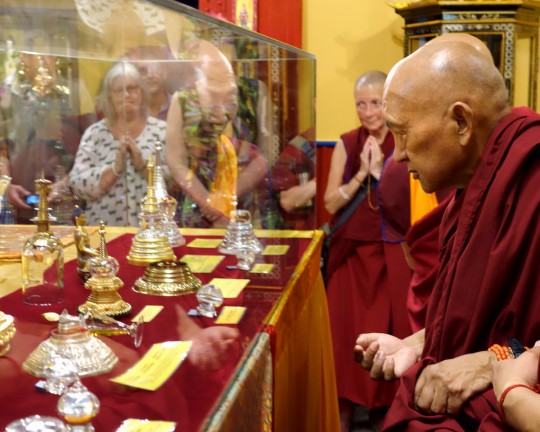
Lama Zopa Rinpoche viewing relics of Buddhist masters displayed in the newly remodeled relic room in the exhibition center at the Great Stupa of Universal Compassion, Bendigo, Australia, October 2014. Photo by Ven. Roger Kunsang.
In the Sutra of Golden Light, Chapter 18, it says:
“Then the Tathagata struck the surface of the earth with his hand, whose palm was soft as the newly bloomed lotus and marked with a thousand-spoked wheel. As soon as he struck it, the earth shook in six ways and there arose a stupa made of silver, gold and jewels. Then the Tathagata said to the Venerable Ananda: ‘Ananda, open this stupa.’ Heeding these instructions, the Venerable Ananda opened the stupa. Inside he saw an urn covered with gold and inlaid with jewels and pearls. Having seen this, he said to the Tathagata, ‘O Transcendent Lord, there is an urn made of gold.’ The Tathagata said, ‘Open these seven urns.’ Accordingly, he opened them. He saw relics whose colors were like snow and white lily. Seeing this, the Venerable Ananda said to the Tathagata, ‘O Transcendent Lord, there are relics.’ Then the Tathagata said, ‘Ananda, bring here the relics of the great being.’ Then the Venerable Ananda took those relics and brought them to the Tathagata. Taking the relics to the thousand bhikshus and holding them in his hand, the Tathagata addressed them in this way:
Here are the bones of one endowed with excellent virtue and supreme intellect,
Humility, meditation, delight through patience and sublime fame;
One who continually strove for the wisdom of his enlightenment;
Intelligent and possessing steadfast joyous perseverance,
He always delighted in giving.
“Then the Tathagata said this to the thousand bhikshus: ‘O bhikshus, offer homage to the bodhisattva’s relics fully charged with ethics and virtue, which are a field of merit and extremely rare to see.’ Then, their hearts filled with aspiration, those bhikshus paid homage to the relics with hands folded in reverence.”
Watch a short video clip of Lama Zopa Rinpoche doing prayers in front of the relics at the Great Stupa of Universal Compassion in Bendigo, Australia.
Learn more about Lama Zopa Rinpoche, spiritual director of the Foundation for the Preservation of Mahayana Tradition (FPMT), and Rinpoche’s vision for a better world. Sign up to receive news and updates.
- Home
- News/Media
- Study & Practice
- About FPMT Education Services
- Latest News
- Programs
- New to Buddhism?
- Buddhist Mind Science: Activating Your Potential
- Heart Advice for Death and Dying
- Discovering Buddhism
- Living in the Path
- Exploring Buddhism
- FPMT Basic Program
- FPMT Masters Program
- FPMT In-Depth Meditation Training
- Maitripa College
- Lotsawa Rinchen Zangpo Translator Program
- Universal Education for Compassion & Wisdom
- Online Learning Center
- Prayers & Practice Materials
- Overview of Prayers & Practices
- Full Catalogue of Prayers & Practice Materials
- Explore Popular Topics
- Benefiting Animals
- Chenrezig Resources
- Death & Dying Resources
- Lama Chopa (Guru Puja)
- Lama Zopa Rinpoche: Compendium of Precious Instructions
- Lama Zopa Rinpoche: Life Practice Advice
- Lama Zopa Rinpoche Practice Series
- Lamrim Resources
- Mantras
- Prayer Book Updates
- Purification Practices
- Sutras
- Thought Transformation (Lojong)
- Audio Materials
- Dharma Dates – Tibetan Calendar
- Translation Services
- Publishing Services
- Teachings and Advice
- Find Teachings and Advice
- Lama Zopa Rinpoche Advice Page
- Lama Zopa Rinpoche: Compendium of Precious Instructions
- Lama Zopa Rinpoche Video Teachings
- ༧སྐྱབས་རྗེ་བཟོད་པ་རིན་པོ་ཆེ་མཆོག་ནས་སྩལ་བའི་བཀའ་སློབ་བརྙན་འཕྲིན།
- Podcasts
- Lama Yeshe Wisdom Archive
- Buddhism FAQ
- Dharma for Young People
- Resources on Holy Objects
- Ways to Offer Support
- Centers
- Affiliates Area
- Teachers
- Projects
- Charitable Projects
- Make a Donation
- Applying for Grants
- News about Projects
- Other Projects within FPMT
- Support International Office
- Projects Photo Galleries
- Give Where Most Needed
- FPMT
- Shop
Translate*
*powered by Google TranslateTranslation of pages on fpmt.org is performed by Google Translate, a third party service which FPMT has no control over. The service provides automated computer translations that are only an approximation of the websites' original content. The translations should not be considered exact and only used as a rough guide.In the lam-rim, there’s some advice on how to get up early in the morning without being overwhelmed by sleep. Before getting into bed the night before, wash your feet while thinking of light. Try it; it works.







